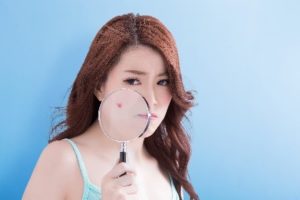 Acne refers to a common set of skin problems that are related to the sebaceous glands, which produce sebum (oil) to help naturally moisturize the skin. Acne typically affects the skin on the face but can also appear on other parts of the body including the back, chest and arms. If left untreated, the more severe symptoms of acne can lead to permanent scarring of the skin and can also be detrimental on an emotional level since acne can significantly affect the appearance of a person. The symptoms of acne vary and include the following:
Acne refers to a common set of skin problems that are related to the sebaceous glands, which produce sebum (oil) to help naturally moisturize the skin. Acne typically affects the skin on the face but can also appear on other parts of the body including the back, chest and arms. If left untreated, the more severe symptoms of acne can lead to permanent scarring of the skin and can also be detrimental on an emotional level since acne can significantly affect the appearance of a person. The symptoms of acne vary and include the following:
What is Acne?
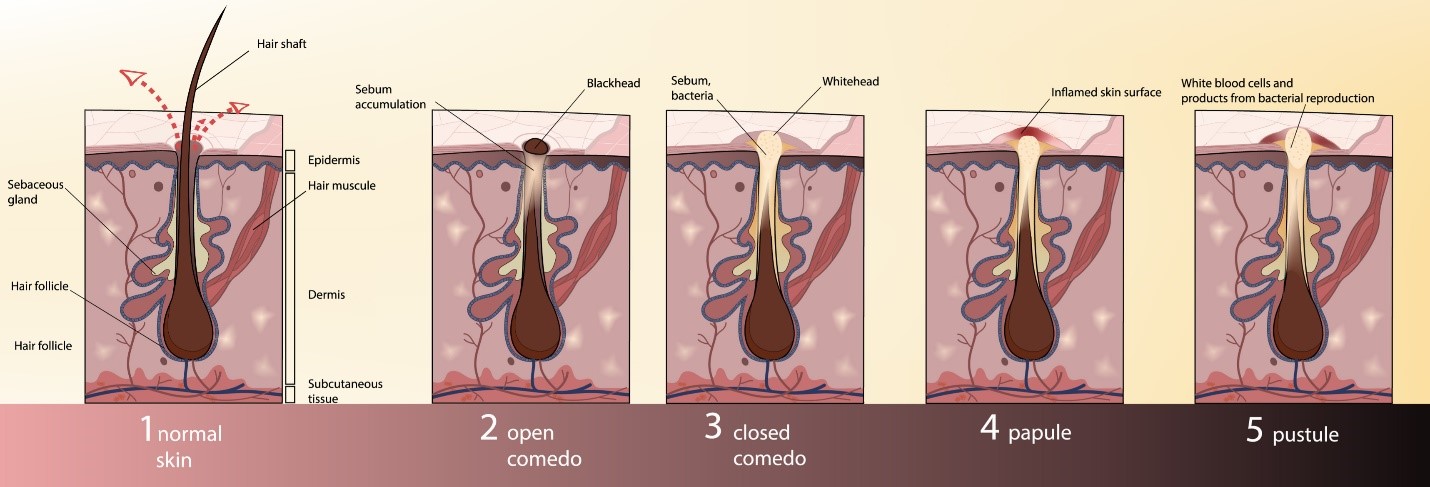
Blackheads – A less severe form of acne, also known as “open comedones”, blackheads are pores clogged with sebum (oil) and dead skin cells where the skin over the pore is open. Their black color is from the exposure of the sebum and dead skin cells to the air.
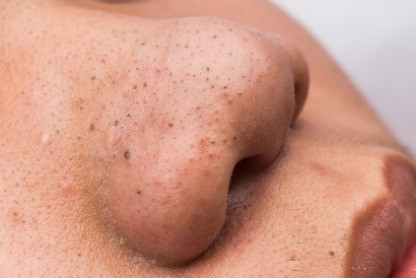
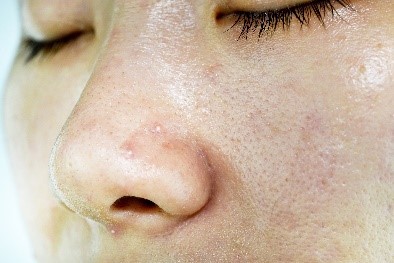
Whiteheads – Also known as “closed comedones”, whiteheads are pores clogged with sebum (oil) and dead skin cells where the skin over the pore is closed. They are characterized by their white appearance on the skin, which is the color of the accumulated sebum and dead skin cells.
Papules – A more severe form of acne, a papule is a clogged pore where the surrounding skin is irritated and inflamed. Papules are characterized by the redness in and around the affected pores.
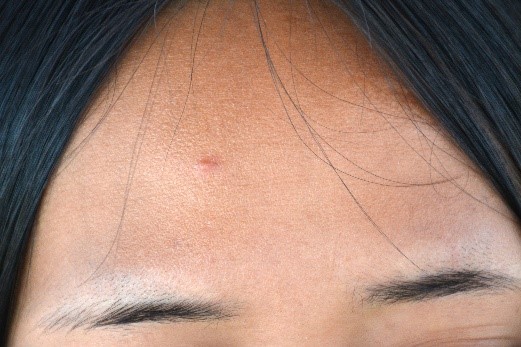
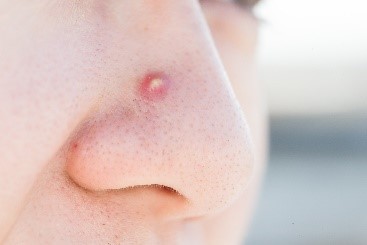
Pustules – The most severe form of acne, a pustule is a clogged pore that has become infected and filled with pus. They are characterized by the yellow pus in the pore and redness and swelling around the pore. Depending on the frequency and severity, pustules can leave the skin permanently scarred.
What causes acne?
While the exact cause of acne is not fully understood, it is known that it is usually linked to the following set of factors.
Hormones – Increases and fluctuations in hormone levels will increase the amount of sebum (oil) that is being produced by the sebaceous glands in the skin. In adults, acne is most common among women as hormone levels typically fluctuate during menstruation, menopause, or pregnancy. In young adults, acne commonly affects both sexes during the teenage years when hormone levels are typically higher.
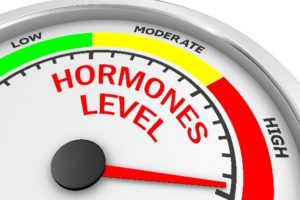

Genetics – If there is a family history of acne then it is more likely that a person will suffer from acne as well.
Cosmetics – Use of greasy, pore-clogging (comedogenic) cosmetics can contribute to acne symptoms.
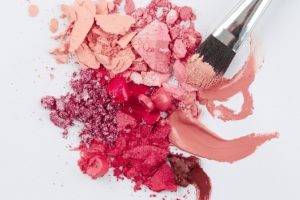
Abrasion – Over vigorous scrubbing, rubbing, picking, shaving or other manipulation of the skin can irritate the skin and make it more prone to acne.
Bacteria – Healthy hair follicles will naturally carry the bacterium Propionibacterium acnes, which feeds on sebum. Once a follicle becomes clogged, it is an ideal environment for bacteria to multiply. The bacteria produces enzymes and chemicals that irritate and inflame the skin around a clogged follicle leading to more severe symptoms of acne such the papules and pustules described above.

Air Pollution – The microparticles from air pollution can clog pores and irritate the skin, trapping sebum in the skin and leading to the different symptoms of acne discussed above. This is especially more challenging during the winter, when the air is dense and there are more microparticles per square meter than in other times of the year.
Diet – While not conclusively linked to acne, for some people eating greasy food, dairy products or foods high in processed sugar may increase the likelihood of acne.

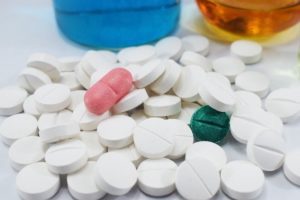
Medications – Use of contraceptive pills, glucocorticoids, iodides, bromides, artificial androgens and other medications have been known to have acne as a side effect for some people.
How do I cure my acne?
Just as the exact cause of acne is not fully understood, there is no exact way to cure acne that will work for everyone and no cure is instant or permanent. However, there are a combination of things that you can do to treat the acne symptoms and learn what works best for you.
Hygiene – Even if you are not suffering from acne, it is good to clean and care for your face daily. Stridex recommends incorporating a daily cleansing routine with exfoliation using salicylic acid.
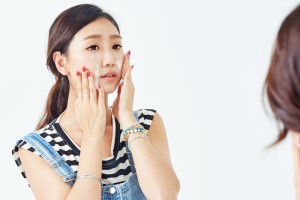
Cosmetics – When suffering with acne symptoms, it is a good idea to limit the cosmetics that you are applying to the affected areas. It is best to avoid heavy products such as foundation, powder or blush and to use oil free cosmetics that do not contain dyes. If acne is recurring, look for cosmetics labeled “noncomodogenic”, which means they should not clog pores and contribute to acne.

Do not touch – Your first impulse may be to squeeze the acne to burst open the clogged pore but you should resist this as it can lead to infection and scarring. Try not touch the affected area as you can spread the bacteria and irritate the already inflamed skin.
Sun protection – It is best to try to stay out of the sun during more severe acne symptoms like papules and pustules because the ultraviolet rays can worsen inflamed, red skin and can leave areas hyperpigmented (dark spots) after healing. This is particularly true when the sun is at its highest point between 10:00am and 2:00pm. If you must go out, use a and hat to limit your sun exposure.


Exercise – Strength and cardiovascular training is good for your whole body, including your skin.
Diet – Avoid greasy foods and substitute with fresh fruits, vegetables and whole grains.


Relax – Stress can contribute to acne symptoms and it is important to manage your stress not only for your skin and body health but also for your overall well-being.
When should I see a doctor about my acne?
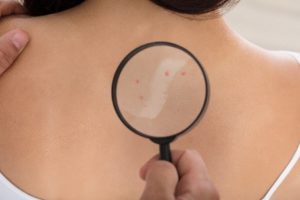 When you reach the point that you are asking yourself if you should see a doctor about your acne, it is probably a good idea to schedule an appointment with a dermatologist. Your dermatologist can give you an objective opinion on your condition as well as offering information on advanced treatment options that may be available such as light therapy or prescription medicines.
When you reach the point that you are asking yourself if you should see a doctor about your acne, it is probably a good idea to schedule an appointment with a dermatologist. Your dermatologist can give you an objective opinion on your condition as well as offering information on advanced treatment options that may be available such as light therapy or prescription medicines.
